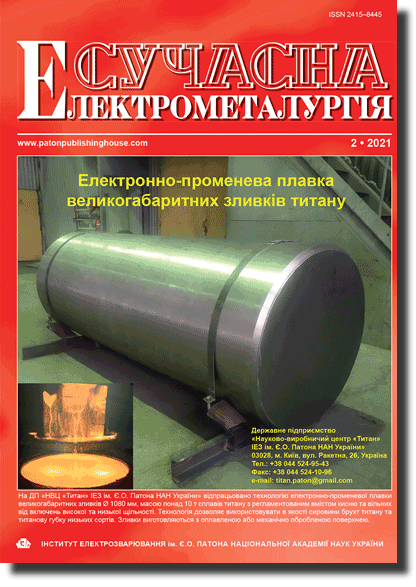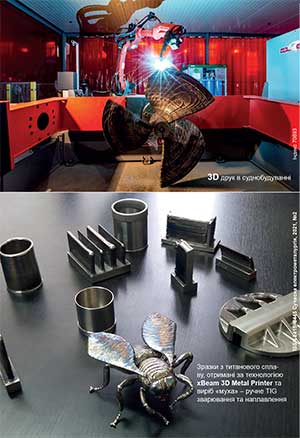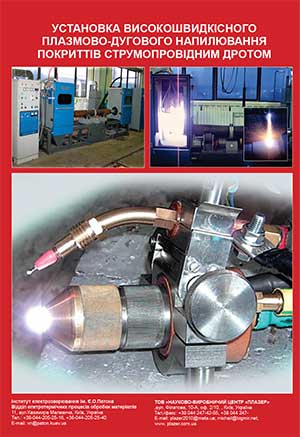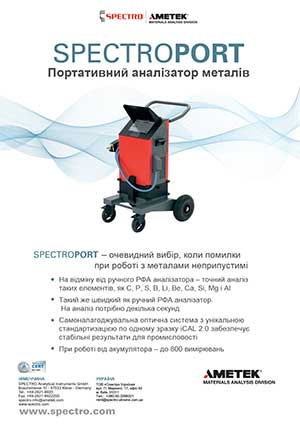| 2021 №02 (07) |
DOI of Article 10.37434/sem2021.02.01 |
2021 №02 (02) |
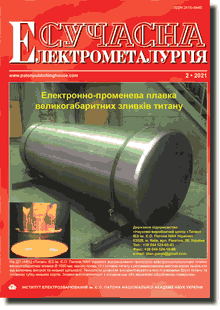
"Suchasna Elektrometallurgiya" (Electrometallurgy Today), 2021, #2, 3-12 pages
Electrochemical processes in electroslag melting (Review)
G.P. Stovpchenko, A.V. Kadilnikova
E.O. Paton Electric Welding Institute of the NAS of Ukraine. 11 Kazymyr Malevych Str., Kyiv, 03150, Ukraine. E-mail: office@paton.kiev.ua
Abstract
Electroslag remelting is the leading processes of special melting for high-quality steels and alloys production. In terms of mechanical (especially plasticity), service properties, density and cleanness, the ESR steels significantly shift the similar materials produced by methods of traditional metallurgy. The degree of steel composition refining depends on slag chemistry and properties, which determine the thermal efficiency and affects the temperature regime of a metal bath and conditions of an ingot solidification. Electrolysis is not the primary process and purpose of ESR; however, since the transfer of electric current in molten slags is carried out by ions mainly, the electrochemical reactions change the composition of both the slag and metal. The article analyzes state-of-the-art research revealing the nature of electrochemical processes and the main cathodic and anodic reactions at the ESR-type processes using direct current, in view of the possibilities of obtaining less sulphur and oxygen content in the steel. The effect of direct current polarity onto an electrode melting rate are considered. The topical issues for further research on the electrochemical side of the ESR process have been outlined in order to increase its efficiency and create new applications of the process. Ref. 60, Fig. 8. Keywords: electroslag remelting; slag; ionic melt; electrochemical; cathodic and anodic reactions; electrical conductivity; viscosity; electrode polarity
Received 23.06.2021
References
1. Paton, B.E., Medovar, B.I. (1981) Electroslag metal. Kiev, Naukova Dumka [in Russian].2. Medovar, B.I., Shevtsov, V.L., Marinsky, G.S. et al. (1978) Thermal processes in ESR. Ed. by B.I. Medovar. Kiev, Naukova Dumka [in Russian].
3. Latash, Yu.V., Medovar, B.I. (1970) Electroslag remelting. Moscow, Metallurgy [in Russian].
4. Nafziger, R.H. (1976) The electroslag melting process. United States Bureau of Mines, Bulletin 669, Washington.
5. Medovar, L.B., Saenko, V.Ya., Stovpchenko, A.P. et al. (2010) Electroslag technologies for producing large forging ingots. Modern electrometallurgy, 3, 5-10 [in Russian].
6. Holzgruber, V. (1977) Possibilities and limitations of the impact on the structure and properties of ESR ingots. Electroslag remelting. Kiev, Naukova Dumka, 60-75 [in Russian].
7. Mitchell, A., Bell, M. (1972) Origin of Oxide Inclusions in Ingots Made by the Electroslag Process. Canadian Met. Quart., 11(2), 363-369. https://doi.org/10.1179/cmq.1972.11.2.363
8. Mitchell, A., Jackson, R.O., Balantine, A.S. (1975) Macrosegregation, fluid motion and heat transfer in the ESR process. Electroslag remelting. Kiev, Naukova Dumka, 29-38 [in Russian].
9. Klyuev, M.M., Volkov, S.E. (1984) Electroslag remelting. Moscow, Metallurgy [in Russian].
10. Medovar, L., Petrenko, V., Sybir., A., Stovpchenko, G. (2014) Quality and efficiency of ESR ingots production. In: Proc. of 2nd Int. Conf. Ingot Casting Rolling and Forging (ICRF2014), Milan, 7-9 May 2014, Italy.
11. Stovpchenko, G.P, Lisova, L.O., Goncharov, I.O., Gusiev, I.V. (2018) Physico-chemical properties of the ESR slags system CaF2-Al2O3-(MgO,TiO2). J. of Achievements in Materials and Manufacturing Engineering, 89(2), 64-72. https://doi.org/10.5604/01.3001.0012.7110
12. Mitchell, A. (2005) Slag functions in the ESR process. LMPC 2005 - Proceedings of the 2005. Inter. Symp. on Liquid Metal Processing and Casting, 195-200.
13. Paton B.E. (1974) Technology of electric welding of metals and alloys by fusion. Moskow, Mechanical engineering [in Russian].
14. Mitchell, A., Beynon, G. (1971) Electrode polarization in the DC electroslag melting of pure iron. Metall. Transact., 2, 3333-3345. https://doi.org/10.1007/BF02811614
15. Medovar, B.I., Tsykulenko, A.K., Dyachenko, D.M. (1990) The quality of electroslag metal. Ed. by B.E. Paton, B.I. Medovar. Kiev, Naukova dumka [in Russian].
16. Lepinskikh, B.M., Istomin, C.A. (1984) Electrochemical alloying and modification of metal. Moskow, Nauka [in Russian].
17. Farahat, R., Eissa, M., Megahed, G. et al. (2019) Effect of EAF Slag Temperature and Composition on its Electrical Conductivity. ISIJ Intern., 59(2), 216-220. https://doi.org/10.2355/isijinternational.ISIJINT-2018-507
18. Hara, Sh., Hashimoto, H., Ogino, K. (1983) Electrical Conductivity of Molten Slags for Electroslag Remelting. Transact. ISIJ, 23, 1053-1058. https://doi.org/10.2355/isijinternational1966.23.1053
19. Kenneth, C., Mills, K.C. (1993) The Influence of Structure on the Physico-chemical Properties of Slags. ISIJ Inter., 33(1), 148-155. https://doi.org/10.2355/isijinternational.33.148
20. Mills, K.C. Yuan, L., Jones, R.T. (2011) Estimating the physical properties of slags. J. of the South African Institute of Mining and Metallurgy, 111, 649-658.
21. Mills, K.C., Yuchu, S.U., Zushu, L.I., Brooks, R.F. (2004) Equations for the Calculation of the Thermo-physical Properties of Stainless Steel. ISIJ Intern., 44(10), 1661-1668. https://doi.org/10.2355/isijinternational.44.1661
22. Park, J.H., Dong, J.M., Joon, M., Song, H.S. (2002) The effect of CaF(2) on the viscosities and structures of CaO-SiO(2)- (MgO)-CaF(2) slags. Metallurgical and Materials Transactions. Process Metallurgy and Materials Processing Science, B. 33B(5), 723-729. https://doi.org/10.1007/s11663-002-0026-1
23. Schwenk, M., Bernd, F. (2016) Role and effects of slag components in ESR processes.
24. Tsunawaki, Y., Iwamoto, N., Hattori, T., Mitsuishi, A. (1981) Analysis of CaO⋅SiO2 and CaO∙SiO2∙CaF2 glasses by Raman spectroscopy. J. of Non-Crystalline Solids, 44(2-3), 369-378. https://doi.org/10.1016/0022-3093(81)90039-9
25. Zhang, X., Liu, Ch. (2020) Effect of Fluorine on Melt Structure for CaO-SiO2-CaF2 and CaO-Al2O3-CaF2 by Molecular Dynamics Simulations. ISIJ Inter., 60, 2176-2182. https://doi.org/10.2355/isijinternational.ISIJINT-2020-002
26. Hayashi, M., Nabeshima, N., Fukuyama, H., Nagata, K. (2002) Effect of Fluorine on Silicate Network for CaO-CaF2- SiO2 and CaO-CaF2-SiO2-FeOx Glasses. Ibid., 42, 352-358. https://doi.org/10.2355/isijinternational.42.352
27. Seetharaman, S., Teng, L., Hayashi, M., Wang, L. (2013) Understanding the Properties of Slags. Ibid., 3, 1-8. https://doi.org/10.2355/isijinternational.53.1
28. Yesin, O.A. (1946) The electrical nature of liquid slag. Sverdlovsk, Publishing house of the House of Technology of the Ural Industrial Institute by Kirov [in Russian]
29. Esin, O.A., Geld, P.V. (1966) Physical chemistry of pyrometallurgical processes. 2nd ed. Rev. and additional. Moscow, Metallurgy [in Russian].
30. Frumkin, A.N., Bagotsky, V.S., Iofa, Z.A., Kabanov, B.N. (1952) Kinetics of electrode processes. Moscow, Moscow University Press [in Russian].
31. Hamann, W. (1985) Vielstich: Elektrochemie I - Elektrolytische Leitfähigkeit, Potentiale, Phasengrenzen, aus der Reihe: taschentext, 2. überarbeitete Auflage. VCH-Verlagsgesellschaft. Weinheim, 90(2), 20-25.
32. Rieger, P. H. (1994) Electrochemistry. Chapman and Hall, One Penn Plaza. New York, London.
33. Popel, S.I., Sotnikov, A.I., Boronenkov, V.N. (1986) Theory of metallurgical processes. Moskow, Metallurgy [in Russian].
34. Mitchell, A. (2016) Electrochemical Aspects of the ESR Process. IOP Conference Series. Materials Sci. and Engineering, 143-156. https://doi.org/10.1088/1757-899X/143/1/012001
35. Kato, M., Hasegawa, K., Nomura, S., Inouye, M. (1983) Transfer of Oxygen and Sulfur during Direct Current Electroslag Remelting. Transact. ISIJ, 23(7), 618-627. https://doi.org/10.2355/isijinternational1966.23.618
36. Kojima, Y., Kato, M., Nomura, S., Inouye, M. (1977) On the Oxygen Transfer during Direct Current Electroslag Remelting of Carbon Steel. J. Stage, 63(13), 2191-2197. https://doi.org/10.2355/tetsutohagane1955.63.13_2191
37. Etienne, M. (1970) The loss of reactive elements during electroslag processing of iron-base alloys. Ph.D. Thesis, University of British Columbia.
38. Schwerdtfeger, K., Norbert, N., Detief, K. (1982) Archiv fur das Eisenhuttenwessen. Wiley Online Library, 53, 463-468. https://doi.org/10.1002/srin.198205181
39. Kawakami, M., Nagata, K., Murayama, M. et al. (1973) Tetsu-to-Hagane. J. Iron Steel Inst., 63, 2161-2171.
40. Karimi-Sibaki, E., Kharicha, A., Wu, M. et al. (2017) Toward Modeling of Electrochemical Reactions during Electroslag Remelting (ESR) Process. Steel Research Inter., 88(5), 1-8. https://doi.org/10.1002/srin.201700011
41. Karimi-Sibaki, E., Kharicha, A., Wu, M. et al. (2019) Modeling electrochemical transport of ions in the molten CaF2-FeO slag operating under a DC voltage. Applied Mathematics and Computation, Elsevier, 357(C), 357-373. https://doi.org/10.1016/j.amc.2018.01.008
42. Karimi-Sibaki, E., Kharicha, A., Wu, M. et al. (2020) A Numerical Investigation on the Electrochemical Behavior of CaO and Al2O3 in the ESR Slags. Metallurgical and Materials Transact. B, 871-879. https://doi.org/10.1007/s11663-020-01795-y
43. Matthew, J.M., Krane, A., Jardy, Williamson, L., Beaman, J. (2013) Proceedings of the 2013 Inter. Symp. on Liquid Metal Processing & Casting. Edited, Springer International Publishing.
44. Kawakami, M., Takenaka, T., Ishikawa, M. (2002) Ironmaking Steelmaking Electrode reactions in dc electroslag remelting of steel rod. Ironmaking & Steelmaking, 29(4), 287-292. https://doi.org/10.1179/030192302225005132
45. Kharicha, Ab., Wu, M., Ludwig, A. et al. (2012) Influence of the Frequency of the Applied AC Current on the Electroslag Remelting Process. Modeling and Simulation in Materials Processing, 13-19. https://doi.org/10.1002/9781118364697.ch17
46. Chang, L. et al. (2009) Effect of low-frequency AC power supply during electroslagremelting on qualities of alloy steel. J. of Iron and Steel Research Inter., 16, 7-11. https://doi.org/10.1016/S1006-706X(09)60052-2
47. Mitchell, А., Nafriger, R. H. et al. (1977) Electrochemical Reactions in Electroslag Process. Bulletin 669, The Electroslag Melting Process, Albany Metallurgy Research Center, Albany, Oreg., CH.2, 15-25.
48. Kharicha, A., Ludwig, A., Wu., M. (2005) Simulation of droplet formation during DC Electroslag remelting process. In: Proc. of 1st Inter. Conf. Brno, 25-27 October 2005, 343-360.
49. Kharicha, A., Alemany, A., Bornas, D. (2005) Hydrodynamic Study of a Rotating MHD Flow in a Cylindrical Cavity by Ultrasound Doppler Shift Method. Inter. J. of Engineering Sci., 589-615. https://doi.org/10.1016/j.ijengsci.2004.09.010
50. Minh, N.O., King, T.B. (1979) The contribution of electrochemical reactions to sulfur transfer from electrode to slag in electroslag remelting. Metall. Transact. B, 10, 623. https://doi.org/10.1007/BF02662565
51. Zhang, J.W., Guo, P.M., Li, Z.B. (2000) Study on electrocapillary oscillation in ESR system. Iron Steel, 35(5), 23-26.
52. Shi, Cheng-bin, Huang, Yi, Zhang, Jian-xiao, Li, Jing, Zheng, Xin. (2021) Review on desulfurization in electroslag remelting. Int. J. Miner. Metall. Mater., 28(1), 18-29. https://doi.org/10.1007/s12613-020-2075-3
53. Aksenov, I.A., Matveeva, M.A., Chumanov, I.V. (2019) Influence of the ESR parameters on the removal of sulfur. Russ. Metall., 6, 601-607. https://doi.org/10.1134/S003602951906003X
54. Wang, Q., Liu, Yu, He, Zhu et al. (2017) Numerical Analysis of Effect of Current on Desulfurization in Electroslag Remelting Process. ISIJ Inter., 57, 329-336. https://doi.org/10.2355/isijinternational.ISIJINT-2016-566
55. Wang, Q., Liu, Yu, Wang, F. et al. (2017) Numerical Study on the Effect of Electrode Polarity on Desulfurization in Direct Current Electroslag Remelting Process. Metallurgical and Materials Transact. B, 48(5), 2649-2663. https://doi.org/10.1007/s11663-017-1040-7
56. Paar, A., Schneider, R., Zeller, P. et al. (2013) Influence of the Polarity on the Cleanliness Level and the Inclusion Types in the ESR Process. In: Proc. of Int. Symp. on Liquid Metal Processing, 29-36. https://doi.org/10.1007/978-3-319-48102-9_4
57. Reinhold, S. E., Schneider, M., Mülleder, P. et al. (2016) Effects of Low Frequency Alternating Currents on the ElectroSlag Remelting Process. BHM Berg- und Hüttenmännische Monatshefte, 1, 20-26. https://doi.org/10.1007/s00501-016-0462-x
58. Du, G., Li, J., Wang, Zhong-Bing (2018) Effect of Operating Conditions on Inclusion of Die Steel during Electroslag Remelting. ISIJ Inter., 58(1), 78-87. https://doi.org/10.2355/isijinternational.ISIJINT-2017-429
59. Wang, H., Jang, Y.I., Huang, B. et al. (1999) TEM study of electrochemical cycling-induced damage and disorder in LiCoO2 cathodes for rechargeable lithium batteries. J. of Electrochemical Society, 146(2), 473-480. https://doi.org/10.1149/1.1391631
60. Wang, D, Gmitter A., Sadoway D. (2011) Production of oxygen gas and liquid metal by electrochemical decomposition of molten iron oxide. Ibid., 158(6), 51-54. https://doi.org/10.1149/1.3560477
Advertising in this issue:
The cost of subscription/purchase order journals or individual articles
| Journal/Currency | Annual Set | 1 issue printed |
1 issue |
one article |
| TPWJ/USD | 384 $ | 32 $ | 26 $ | 13 $ |
| TPWJ/EUR | 348 € | 29 € | 24 € | 12 € |
| TPWJ/UAH | 7200 UAH | 600 UAH | 600 UAH | 280 UAH |
| AS/UAH | 1800 UAH | 300 UAH | 300 UAH | 150 UAH |
| AS/USD | 192 $ | 32 $ | 26 $ | 13 $ |
| AS/EUR | 180 € | 30 € | 25 € | 12 € |
| SEM/UAH | 1200 UAH | 300 UAH | 300 UAH | 150 UAH |
| SEM/USD | 128 $ | 32 $ | 26 $ | 13 $ |
| SEM/EUR | 120 € | 30 € | 25 € | 12 € |
| TDNK/UAH | 1200 UAH | 300 UAH | 300 UAH | 150 UAH |
| TDNK/USD | 128 $ | 32 $ | 26 $ | 13 $ |
| TDNK/EUR | 120 € | 30 € | 25 € | 15 € |
AS = «Automatic Welding» - 6 issues per year;
TPWJ = «PATON WELDING JOURNAL» - 12 issues per year;
SEM = «Electrometallurgy Today» - 4 issues per year;
TDNK = «Technical Diagnostics and Non-Destructive Testing» - 4 issues per year.





